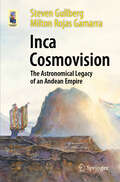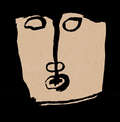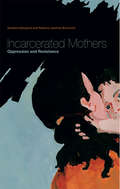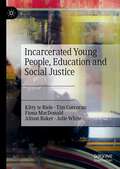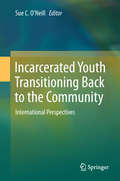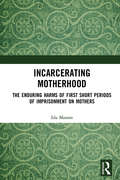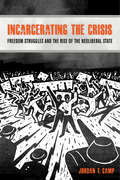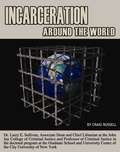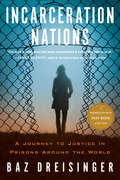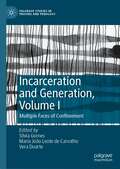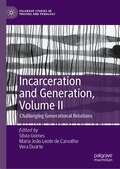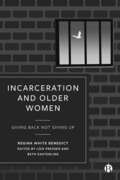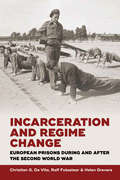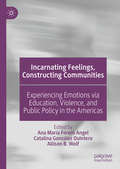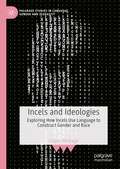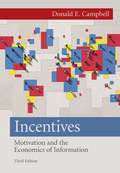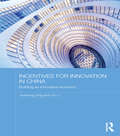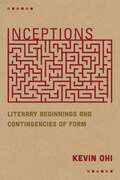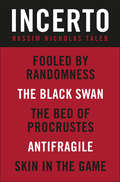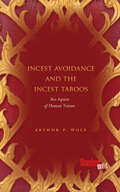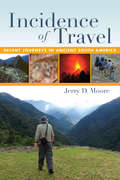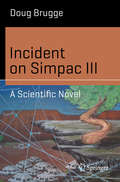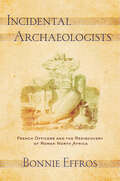- Table View
- List View
Inca Cosmovision: The Astronomical Legacy of an Andean Empire (Astronomers' Universe)
by Steven Gullberg Milton Rojas GamarraThe Inkas (Quechua spelling) worshipped the Sun, and their emperor was thought to be the son of the Sun. They conquered most of the Andes and their former empire is replete with examples of their astronomy. They used solar positions on the horizon for calendrical purposes and managed their crops and religious festivals in this manner. Many examples remain of their intentional light and shadow effects that demonstrate their sophisticated understanding of the Sun’s movement and of solar horizon events. Evidence of their astronomy can only be fully understood in its cultural context, and that is the focus of this book. Inka Cosmovision explores the cosmic worldview of the Inkas from the perspective of oral traditions passed from one generation to the next among the Inkas’ living descendants. You will learn about Inka astronomy in a way that you perhaps have never encountered. An author of the book is Quechua, a descendant of the Inkas, and what you will read benefits greatly not only from the field research of both authors, but from the many stories he learned from his parents and grandparents and from his Amauta, a highly respected Indigenous teacher of Inka culture. This book enlightens about Inka cosmovision as no other has before.
Incantations: Songs, Spells and Images by Mayan Women
by Ambar PastThis book of poems and stark, vivid illustrations is rooted in the female soul of indigenous Mexico. The Tzotzil women of the Chiapas Highlands are the poets and the artists. Ambar Past, who collected the poems and drawings, includes a moving essay about their poetics, beliefs, and history.In the 1970s, living among the Maya, Past watched the people endure as an epidemic swept through a village. No help came. Many children died. One mother offered her dead child a last sip of Coca-Cola and uttered a prayer: Take this sweet dew from the earth, take this honey. It will help you on your way. It will give you strength on your path.Incantations like this--poems about birth, love, hate, sex, despair, and death--coupled with primitive illustrations, provide a compelling insight into the psychology of these Mayan women poets. The Cinco Puntos edition of Incantations is a facsimile of the original handmade edition produced by the Taller Leñateros. It was reviewed in The New York Times.At the age of twenty-three, Ambar Past left the United States for Mexico. She lived among the Mayan people, teaching the techniques of native dyes and learning to speak Tzotzil. She is the creator of the graphic arts collective Taller Leñateros in Chiapas and was a founding member of Sna Jolobil, a weaving cooperative for Mayan artisans.
Incarcerated Mothers: Oppression And Resistance
by Gordana EljdupovicA large proportion—and in many jurisdictions the majority—of incarcerated women are mothers. Popular attention is often paid to challenges faced by children of incarcerated mothers while incarcerated women themselves often do not “count” as mothers in mainstream discourse. This is the first anthology on incarcerated mothers’ experiences that is primarily based on and reflects the Canadian context. It is also trans- national in scope as it covers related issues from other countries around the world. These essays examine connections between mothering and incarceration, from analysis of the justice system and policies, criminalization of motherhood, to understanding experiences of mothers in prisons as presented in their own voices. They highlight structures and processes which shape and ascribe incarcerated woman’s identity as a mother, juxtaposing it with scripted and imposed mainstream norms of a “good” or “real” mother. Moreover, these essays identify and track emergence of mothers’ resistance and agency within and in spite of the confines of their circumstances.
Incarcerated Young People, Education and Social Justice
by Tim Corcoran Fiona MacDonald Julie White Kitty te Riele Alison BakerThis book foregrounds the provision of education for young people who have been remanded or sentenced into custody. Both international conventions and national legislation and guidelines in many countries point to the right of children and young people to access education while they are incarcerated. Moreover, education is often seen as an important protective and ‘rehabilitative’ factor. However, the conditions associated with incarceration generate particular challenges for enabling participation in education. Bridging the fields of education and youth justice, this book offers a social justice analysis through the lens of ‘participatory parity’, the book brings together rare interviews with staff and young people in youth justice settings in Australia, secondary data from these sites, a suite of pertinent and frank reports, and international scholarship. Drawing on this rich set of material, the book demonstrates not only the challenges but also the possibilities for education as a conduit for social justice in custodial youth justice. The book will be of immediate relevance to governments and youth justice staff for meaningfully meeting their obligation of enabling children and young people in custody to benefit from education; and of interest to scholars and researchers in education, youth work and criminology.
Incarcerated Youth Transitioning Back to the Community: International Perspectives
by Sue C. O’NeillThis book offers a broad overview of transition practices for incarcerated youth, shaped by local culture, politics, ideologies, and philosophies. It highlights the similarities and differences in international approaches, as well as promising practices. The book is divided into two sections: Section One presents a synthesis of the current research on essential areas shown to promote successful transitions for incarcerated youth, using the Taxonomy for Transition Programming 2.0 as a cohesive framework, Section Two focuses on national perspectives on topical issues impacting local transition practices and/or policy. It provides information pertaining to the respective countries and a summary of key facets of their juvenile justice system, including successful or promising approaches and programs used in transition. This book benefits academics and researchers from a broad range of fields, policy makers and leadership teams from various agencies, associations, and government departments with an interest in juvenile and youth justice, social work, and special education courses on transition planning.
Incarcerating Motherhood: The Enduring Harms of First Short Periods of Imprisonment on Mothers
by Isla MassonIncarcerating Motherhood explores how initial short period in prisons can negatively impact mothers and their children. We have much yet to understand about the enduring harms caused by first time incarceration, especially for minimal time periods and for mothers with dependent children. With large numbers of female prisoners currently incarcerated for short periods in England and Wales (either on short sentences or remand), many of whom are primary caregivers, this book asks: what kind of impact does this imprisonment has on both parent and child in the long term? Based on original research, the experiences of sixteen mothers are presented to voice the material, physical and emotional consequences of short-term imprisonment. The book explores to what extent these mothers lose their sense of identity in a short space of time, whether this continues to affect them post-custody, and what level of support they are provided during and post-custody. This book also explores what bearing the initial separation and the care provided during the mother’s absence will have on their children’s lives, as well as whether the affects of imprisonment on the mother also increase the vulnerability of her children. Incarcerating Motherhood provides a platform for readers to hear how a ‘short sharp shock’ can cause enduring harms to an already vulnerable group in society and how even short-term imprisonment have long-lasting and multi-dimensional consequences.
Incarcerating the Crisis
by Jordan T. CampThe United States currently has the largest prison population on the planet. Over the last four decades, structural unemployment, concentrated urban poverty, and mass homelessness have also become permanent features of the political economy. These developments are without historical precedent, but not without historical explanation. In this searing critique, Jordan T. Camp traces the rise of the neoliberal carceral state through a series of turning points in U.S. history including the Watts insurrection in 1965, the Detroit rebellion in 1967, the Attica uprising in 1971, the Los Angeles revolt in 1992, and events in post-Katrina New Orleans in 2005. Incarcerating the Crisis argues that these dramatic events coincided with the emergence of neoliberal capitalism and the state's attempts to crush radical social movements. Through an examination of the poetic visions of social movements--including those by James Baldwin, Marvin Gaye, June Jordan, José Ramírez, and Sunni Patterson--it also suggests that alternative outcomes have been and continue to be possible.
Incarceration Around the World
by Craig RussellIn one wing of Sweden's top-security prison, red drapes hang from the ceiling while small candles burn on an altar and men kneel in prayer; prisoners can apply to spend some of their sentence in religious meditation. Meanwhile, the guards at Jyderup State Prison in Denmark don't wear uniforms, and they don't carry guns. Prisons in the Congo, on the other hand, are so bad that, according to the New York Times, "If there is a worse place on earth than a Congolese prison, stay well away." Incarceration Around the World describes prison conditions on every continent, from Malawi and Kenya in Africa to China and India in Asia, from Brazil and Venezuela in South America to European nations like Sweden and Denmark.
Incarceration Nation
by Peter K. EnnsThe rise of mass incarceration in the United States is one of the most critical outcomes of the last half-century. Incarceration Nation offers the most compelling explanation of this outcome to date. This book combines in-depth analysis of Barry Goldwater and Richard Nixon's presidential campaigns with sixty years of data analysis. The result is a sophisticated and highly accessible picture of the rise of mass incarceration. In contrast to conventional wisdom, Peter K. Enns shows that during the 1960s, 70s, 80s, and 90s, politicians responded to an increasingly punitive public by pushing policy in a more punitive direction. The book also argues that media coverage of rising crime rates helped fuel the public's punitiveness. Equally as important, a decline in public punitiveness in recent years offers a critical window into understanding current bipartisan calls for criminal justice reform.
Incarceration Nations
by Baz DreisingerBaz Dreisinger travels behind bars in nine countries to rethink the state of justice in a global context Beginning in Africa and ending in Europe, Incarceration Nations is a first-person odyssey through the prison systems of the world. Professor, journalist, and founder of the Prison-to-College-Pipeline, Dreisinger looks into the human stories of incarcerated men and women and those who imprison them, creating a jarring, poignant view of a world to which most are denied access, and a rethinking of one of America's most far-reaching global exports: the modern prison complex.From serving as a restorative justice facilitator in a notorious South African prison and working with genocide survivors in Rwanda, to launching a creative writing class in an overcrowded Ugandan prison and coordinating a drama workshop for women prisoners in Thailand, Dreisinger examines the world behind bars with equal parts empathy and intellect. She journeys to Jamaica to visit a prison music program, to Singapore to learn about approaches to prisoner reentry, to Australia to grapple with the bottom line of private prisons, to a federal supermax in Brazil to confront the horrors of solitary confinement, and finally to the so-called model prisons of Norway. Incarceration Nations concludes with climactic lessons about the past, present, and future of justice.
Incarceration and Generation, Volume I: Multiple Faces of Confinement (Palgrave Studies in Prisons and Penology)
by Sílvia Gomes Vera Duarte Maria João Leote de CarvalhoThis two-volume, edited collection lays the groundwork for an international exploration of incarceration and generation. Volume I explores an array of experiences, dynamics, cultures, interventions and impacts (in its different forms) of incarceration in specific generations: childhood, youth and emerging adulthood, adulthood and older age. It covers topics such as: the expansion of the penal landscape; the abolition of measures involving deprivation of liberty regarding children, the problem of unaccompanied migrant children; the incarceration of young adults and adults, exploring its impacts within and beyond incarceration; and the consequences of imprisoning older populations. Volume II examines intergenerational relations issues within different contexts of incarceration. Both volumes cover a range of geographic, judicial, and administrative contexts of incarceration from contributors across a range of subjects. This collection discusses public policies and the role of the state and the citizen, in particular when a citizen is deprived of liberty. It speaks to academics in criminology, sociology, psychology, and law, and to practitioners and policymakers interested in incarceration.
Incarceration and Generation, Volume II: Challenging Generational Relations (Palgrave Studies in Prisons and Penology)
by Vera Duarte Maria João Leote de Carvalho Silvia GomesThis two-volume, edited collection lays the groundwork for an international exploration of incarceration and generation, covering a range of geographic, judicial and administrative contexts of incarceration from contributors across a range of subjects. Volume II examines intergenerational relations issues within contexts of incarceration. It focuses on the intergenerational continuities in imprisonment; intergenerational justice and citizenship; the impacts of incarceration on multiple generations and within families; and media representations of the intergenerationality of incarceration. Volume I explores an array of experiences, dynamics, cultures, interventions, and impacts of incarceration in different generations. This collection speaks to academics in criminology, sociology, psychology, and law, and to practitioners and policymakers interested in incarceration.
Incarceration and Older Women: Giving Back Not Giving Up
by Regina White BenedictGenerativity or ‘giving back’ is regarded as a common life stage, occurring for many around middle age. For the first time, this book offers qualitative research on the lives and social relationships of older imprisoned women. In-depth interviews with 29 female prisoners in the south-eastern United States show that older women both engage in generative behaviours in prison and also wish to do so upon their release. As prisoners continue to age, the US finds itself at a crossroads on prison reform, with potential decarceration beginning with older prisoners. The COVID-19 pandemic has led many to consider how to thrive under difficult circumstances and in stressing the resilience of older incarcerated women, this book envisions what this could look like.
Incarceration and Regime Change: European Prisons during and after the Second World War
by Christian G. De Vito Ralf Futselaar Helen GreversPolitical instability is nearly always accompanied by fuller prisons, and this was particularly true during the "long" Second World War, when military mobilization, social disorder, wrenching political changes, and shifting national boundaries swelled the ranks of the imprisoned and broadened the carceral reach of the state. This volume brings together theoretically sophisticated, empirically rich studies of key transitional moments that transformed the scope and nature of European prisons during and after the war. It depicts the complex interactions of both penal and administrative institutions with the men and women who experienced internment, imprisonment, and detention at a time when these categories were in perpetual flux.
Incarnating Feelings, Constructing Communities: Experiencing Emotions via Education, Violence, and Public Policy in the Americas
by Ana María Forero Angel Catalina González Quintero Allison B. WolfAttempting to connect the academic discussion around the anthropology and philosophy of the emotions to real-life, everyday experiences, this collection brings together concrete cases and situations arising from specific social and political contexts throughout the Americas. In particular, the authors explore how emotions are generated, constructed, discovered, manipulated, and experienced throughout the Americas by exploring undertheorized topics ranging from investigating the emotional lives of prisoners in Colombia and Brazil who have committed “crimes of passion,” to Colombian soldiers’ experiences of core “emotional events,” to the role of emotions in immigration policy in the United States, to how emotions affect educators’ abilities to teach certain material. Taken as a whole, this innovative, interdisciplinary, collection of original essays is not merely comparative, but rather seeks to bring voices and methodologies from North and South America into conversation to generate innovative analyses and ways to reflect about emotions in response to violence, state policies, and educational systems.
Incarnating Grace: A Theology of Healing from Sexual Trauma
by Julia FederWINNER, COLLEGE THEOLOGY SOCIETY BOOK AWARDPrioritizes survivors of abuse by reexamining Christian ideals about suffering and salvation More than half of women and almost one in three of men in the United States have experienced sexual violence at some time in their lives. Yet our Christian tradition has failed survivors of sexual violence, who have been taught to believe that traumatic suffering brings us closer to God. Incarnating Grace attempts to save our broken ways of talking about God’s grace by unearthing liberating resources buried in the Christian tradition.Christian ideas about salvation have historically contributed to sexual violence in our communities by reinforcing the idea that suffering is salvific. But a God worth worshiping does not want human beings to suffer. Drawing on the sixteenth-century Spanish mystic Teresa of Avila as well as contemporary political and feminist theologians, philosophers, and legal scholars, author and Associate Professor of theology Julia Feder offers an account of Christian salvation as mystical-political.Feder begins by describing the breadth of traumatic wounding and the shape of traumatic recovery, as articulated by psychologists. Since the fullness of post-traumatic healing requires reserves deeper than those which can be articulated by the secular field of psychology alone, the book then introduces the Spanish Carmelite Saint Teresa of Avila and her theological insights, which are most helpful for constructing a post-traumatic theology of healing. Arguing that God stands against violence and suffering, the book also examines the notion of “senseless suffering,” a technical term that comes from Edward Schillebeeckx, a Catholic twentieth-century Flemish priest and theologian. The suffering of sexual violence serves no higher purpose or greater human value and pushes against all ways of making sense of the world as good and orderly. In the following chapters, Feder turns to two Christian virtues that animate post-traumatic recovery, courage and hope, and explores how Christian hope can provide a language to empower courageous activity undertaken toward healing.Incarnating Grace opens a new dialogue about salvation and violence that does not allow evil to have the last word.
Incels and Ideologies: Exploring How Incels Use Language to Construct Gender and Race (Palgrave Studies in Language, Gender and Sexuality)
by Frazer HeritageThis book explores how incels use language and other semiotic resources to construct ideologies of gender and race/ethnicity. The author theorises and positions incels' performances of masculinity against a backdrop of broader social sciences and linguistic literature, and discusses some of the limitations of different lenses through which incels have previously been understood, as well some of the ethical issues involved with researching a hostile community. Corpus linguistic methods and netnographic reflections are used to explore how incels construct ideologies about gender, gendered social actors, and race/ethnicity, as well as where these concepts intersect. Taking a post-structuralist critical analysis to this community reveals a number of way ideologies towards different groups based on social identities are linguistically constructed. This book will be relevant to those researching or studying language, gender, and sexuality, sociology, and criminology. Outside of academic applications, it is also written in a way that is accessible to external organisations interested in equality and the prevention of incel-ideology-motivated offline attacks.
Incentives (3rd Edition): Motivation and the Economics of Information
by Donald E. CampbellWhen incentives work well, individuals prosper. When incentives are poor, the pursuit of self-interest is self-defeating. This book is wholly devoted to the topical subject of incentives from individual, collective, and institutional standpoints. <P><P>This third edition is fully updated and expanded, including a new section on the 2007–08 financial crisis and a new chapter on networks as well as specific applications of school placement for students, search engine ad auctions, pollution permits, and more. Using worked examples and lucid general theory in its analysis, and seasoned with references to current and past events, Incentives: Motivation and the Economics of Information examines: the performance of agents hired to carry out specific tasks, from taxi drivers to CEOs; the performance of institutions, from voting schemes to medical panels deciding who gets kidney transplants; a wide range of market transactions, from auctions to labor markets to the entire economy. Suitable for advanced undergraduate and graduate students studying incentives as part of courses in microeconomics, economic theory, managerial economics, political economy, and related areas of social science.
Incentives for Innovation in China: Building an Innovative Economy (Routledge Contemporary China Series)
by Jun Li Xuedong DingIn the past three decades, China has successfully transformed itself from an extremely poor economy to the world’s second largest economy. The country’s phenomenal economic growth has been sustained primarily by its rapid and continuous industrialization. Currently industry accounts for nearly two-fifths of China’s gross domestic product, and since 2009 China has been the world’s largest exporter of manufactured products. This book explores the question of how far this industrial growth has been the product of government policies. It discusses how government policies and their priorities have developed and evolved, examines how industrial policies are linked to policies in other areas, such as trade, technology and regional development, and assesses how new policy initiatives are encouraging China’s increasing success in new technology-intensive industries. It also demonstrates how China’s industrial policies are linked to development of industrial clusters and regions.
Inceptions: Literary Beginnings and Contingencies of Form
by Kevin OhiThe beginning is both internal and external to the text it initiates, and that noncoincidence points to the text’s vexed relation with its outside. Hence the nontrivial self-reflexivity of any textual beginning, which must bear witness to the self-grounding quality of the literary work— its inability either to comprise its inception or to externalize it in an authorizing exteriority. In a different but related way, the fact that they must begin renders our lives and our desires opaque to us; what Freud called “latency” marks not only sexuality but human thought with a self-division shaped by asynchronicity.From Henry James’s New York Edition prefaces to George Eliot’s epigraphs, from Ovid’s play with meter to Charles Dickens’s thematizing of the ex nihilo emergence of character, from Wallace Stevens’s abstract consideration of poetic origins to James Baldwin’s, Carson McCullers’s, and Eudora Welty’s descriptions of queer childhood, writers repeatedly confront the problem of inception. Inception introduces a fundamental contingency into texts and psyches alike: in the beginning, all could have been otherwise.For Kevin Ohi, the act of inception, and the potential it embodies, enables us to see making and unmaking coincide within the mechanism of creation. In this sense, Inceptions traces an ethics of reading, the possibility of perceiving, in the ostensibly finished forms of lives and texts, the potentiality inherent in their having started forth.
Incerto 5-Book Bundle: Fooled by Randomness, The Black Swan, The Bed of Procrustes, Antifragile, Skin in the Game (Incerto)
by Nassim Nicholas TalebThe landmark five-book series—all together in one ebook bundleThe Incerto is an investigation of opacity, luck, uncertainty, probability, human error, risk, and decision making when we don&’t understand the world, expressed in the form of a personal essay with autobiographical sections, stories, parables, and philosophical, historical, and scientific discussions, in non-overlapping volumes that can be accessed in any order. The main thread is that while there is inordinate uncertainty about what is going on, there is great certainty as to what one should do about it.This ebook bundle includes:FOOLED BY RANDOMNESSTHE BLACK SWANTHE BED OF PROCRUSTESANTIFRAGILESKIN IN THE GAME
Incest Avoidance and the Incest Taboos: Two Aspects of Human Nature
by Arthur P. WolfWhy do most people never have sex with close relatives? And why do they disapprove of other people doing so? Incest Avoidance and Incest Taboos investigates our human inclination to avoid incest and the powerful taboo against incest found in all societies. Both subjects stir strong feelings and vigorous arguments within and beyond academic circles. With great clarity, Wolf lays out the modern assumptions about both, concluding that all previous approaches lack precision and balance on insecure evidence. Researchers he calls "constitutionalists" explain human incest avoidance by biologically-based natural aversion, but fail to explain incest taboos as cultural universals. By contrast, "conventionalists" ignore the evolutionary roots of avoidance and assume that incest avoidant behavior is guided solely by cultural taboos. Both theories are incomplete. Wolf tests his own theory with three natural experiments: bint'amm (cousin) marriage in Morocco, the rarity of marriage within Israeli kibbutz peer groups, and "minor marriages" (in which baby girls were raised by their future mother-in-law to marry an adoptive "brother") in China and Taiwan. These cross-cultural comparisons complete his original and intellectually rich theory of incest, one that marries biology and culture by accounting for both avoidance and taboo.
Incidence of Travel: Recent Journeys in Ancient South America
by Jerry D. MooreIn Incidence of Travel, archaeologist Jerry Moore draws on his personal experiences and historical and archaeological studies throughout South America to explore and understand the ways traditional peoples created cultural landscapes in the region. Using new narrative structures, Moore introduces readers to numerous archaeological sites and remains, describing what it is like to be in the field and sparking further reflection on what these places might have been like in the past. From the snow-capped mountains of Colombia to the arid deserts of Peru and Chile, ancient peoples of South America built cities, formed earthen mounds, created rock art, and measured the cosmos—literally inscribing their presence and passage throughout the continent. Including experiences ranging from the terrifying to the amusing, Moore’s travels intersect with the material traces of traditional cultures. He refers to this intersection as "the incidence of travel." Braiding the tales of his own journeys with explanations of the places he visits through archaeological, anthropological, and historical contexts, Moore conveys the marvelous and intriguing complexities of prehistoric and historic peoples of South America and the ways they marked their presence on the land. Combining travel narrative and archaeology in a series of essays—accounts of discoveries, mishaps of travel, and encounters with modern people living in ancient places—Incidence of Travel will engage any general reader, student, or scholar with interest in archaeology, anthropology, Latin American history, or storytelling.
Incident on Simpac III: A Scientific Novel (Science and Fiction)
by Doug BruggeA few hundred years into the future, a wave of space colonization follows a disastrous earlier attempt to inhabit nearby extrasolar planets. It is guided by a new computational method based on massive data-driven socio-cultural and socio-epidemiological modeling and using novel biological computers, fed with data on Earth’s history of successes and failures. Yet, in the newly settled Simpac system, some unexpected and worrying anomalies begin cropping up, making an urgent expedition to the system necessary: is it the underlying data, the computations, or is some unknown entity tampering with the space colonization program? A race against time ensues as the lives of four strangers begin to converge. While grounded in the social systems aspect, the author posits that the future is likely to be characterized by more biology-based tools than most contemporary science fiction – which most often relies entirely on non-biological hardware in terms of advanced technologies – predicts. The result is an entertaining and skillful blend of thriller and SF, complemented by a nontechnical appendix describing the underlying science.
Incidental Archaeologists: French Officers and the Rediscovery of Roman North Africa
by Bonnie EffrosIn Incidental Archaeologists, Bonnie Effros examines the archaeological contributions of nineteenth-century French military officers, who, raised on classical accounts of warfare and often trained as cartographers, developed an interest in the Roman remains they encountered when commissioned in the colony of Algeria. By linking the study of the Roman past to French triumphant narratives of the conquest and occupation of the Maghreb, Effros demonstrates how Roman archaeology in the forty years following the conquest of the Ottoman Regencies of Algiers and Constantine in the 1830s helped lay the groundwork for the creation of a new identity for French military and civilian settlers.Effros uses France's violent colonial war, its efforts to document the ancient Roman past, and its brutal treatment of the region's Arab and Berber inhabitants to underline the close entanglement of knowledge production with European imperialism. Significantly, Incidental Archaeologists shows how the French experience in Algeria contributed to the professionalization of archaeology in metropolitan France.Effros demonstrates how the archaeological expeditions undertaken by the French in Algeria and the documentation they collected of ancient Roman military accomplishments reflected French confidence that they would learn from Rome's technological accomplishments and succeed, where the Romans had failed, in mastering the region.
